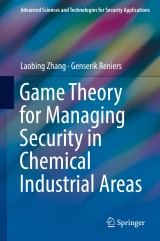Details

Game Theory for Managing Security in Chemical Industrial Areas
Advanced Sciences and Technologies for Security Applications
|
53,49 € |
|
| Verlag: | Springer |
| Format: | |
| Veröffentl.: | 09.07.2018 |
| ISBN/EAN: | 9783319926186 |
| Sprache: | englisch |
Dieses eBook enthält ein Wasserzeichen.
Beschreibungen
<p>This book systematically studies how game theory can be used to improve security in chemical industrial areas, capturing the intelligent interactions between security managers and potential adversaries. The recent unfortunate terrorist attacks on critical infrastructures show that adversaries are intelligent and strategic. Game theoretic models have been extensively used in some domains to model these strategic adversaries. However, there is a lack of such advanced models to be employed by chemical security managers. </p> <p>In this book, game theoretic models for protecting chemical plants as well as clusters are proposed. Different equilibrium concepts are explored, with user-friendly explanation of how to reflect them to realistic cases. Based on efficient analysis of the properties of security issues in chemical plants/clusters, models in this book are capable to support resources allocations, cost-effectiveness analysis, cooperation incentives and alike.</p>
Introduction.- 1. Protecting Process Industries from Intentional Attacks: the State of the Art.- 2. Intelligent Interaction Modelling: Game Theory.- 3. Single Plant Protection: A Game-Theoretical Model for Improving Chemical Plant Protection.- 4. Single Plant Protection: Playing the Chemical Plant Protection Game with Distribution-free Uncertainties.- 5. Single Plant Protection: Playing the Chemical Plant Protection Game involving Attackers with Bounded Rationality.- 6. Multi-Plant Protection: A Game-Theoretical Model for Improving Chemical Clusters Patrolling.- 7. Case Studies. 8. Conclusions and Recommendations.<p> </p>
<p><b>Laobing Zhang</b> was born in 1989 in Leiyang, P.R.China. In 2014, he obtained a MSc in System Simulation at the National University of Defense Technology in Changsha. He joined the Safety and Security Science Group in TUDelft as a PhD researcher, focused on game theory. More specifically, his research on using game theoretical models to improve security in chemical plants (clusters) successfully captures intelligent interactions between security management within chemical plants (the defenders) and potential attackers (the adversaries).</p> <p><b>Genserik Reniers</b> was born in 1974 in Brussels. He obtained a MSc in Chemical Engineering at the Vrije Universiteit Brussel in Brussels, and received his PhD in 2006 in Applied Economic Sciences from the University of Antwerp, Belgium. He founded the Antwerp Research Group on Safety and Security in 2006 at the University of Antwerp, coordinating multi- and interdisciplinary safety and security research. From 2013 on, he is a full professor at the University of Antwerp in Belgium as well as at the Delft University of Technology in the Netherlands (at the Safety and Security Science Group), both in a part-time capacity. Furthermore, since 2015 he also acts as the Academic Director of the Leiden-Delft-Erasmus Centre for Safety and Security, which is an inter-university initiative in the Netherlands for enhancing risk research and education.<br></p>
<p>This book systematically studies how game theory can be used to improve security in chemical industrial areas, capturing the intelligent interactions between security managers and potential adversaries. The recent unfortunate terrorist attacks on critical infrastructures show that adversaries are intelligent and strategic. Game theoretic models have been extensively used in some domains to model these strategic adversaries. However, there is a lack of such advanced models to be employed by chemical security managers. </p><p>In this book, game theoretic models for protecting chemical plants as well as clusters are proposed. Different equilibrium concepts are explored, with user-friendly explanation of how to reflect them to realistic cases. Based on efficient analysis of the properties of security issues in chemical plants/clusters, models in this book are capable to support resources allocations, cost-effectiveness analysis, cooperation incentives and alike.<br></p>
Systematically studies how to mathematically improve security within chemical industrial areas Discusses extensively different scenarios such as complete information and incomplete information, rational and irrational players Proposes an innovative resource allocation algorithm for a multiple-layer closed system as well as an innovative game theoretic model for chemical cluster protection
Diese Produkte könnten Sie auch interessieren:

Integration, Growth, and Cohesion in an Enlarged European Union
von: John Bradley, George G. Petrakos, Julia Traistaru
Preis: 149,79 €

Rethinking Regional Innovation and Change: Path Dependency or Regional Breakthrough
von: Gerhard Fuchs, Philip Shapira
Preis: 149,79 €
-
-
© 2024 media control GmbH
Alle Preise enthalten die gesetzliche Mehrwertsteuer. - AGB
- Impressum
- Datenschutzerklärung
- Kontakt
- FAQ
- Mein Konto
- Erweiterte Suche
- Widerrufsrecht
- Reader-Software
- Desktop-Ansicht
- Gutschein-Code einlösen
